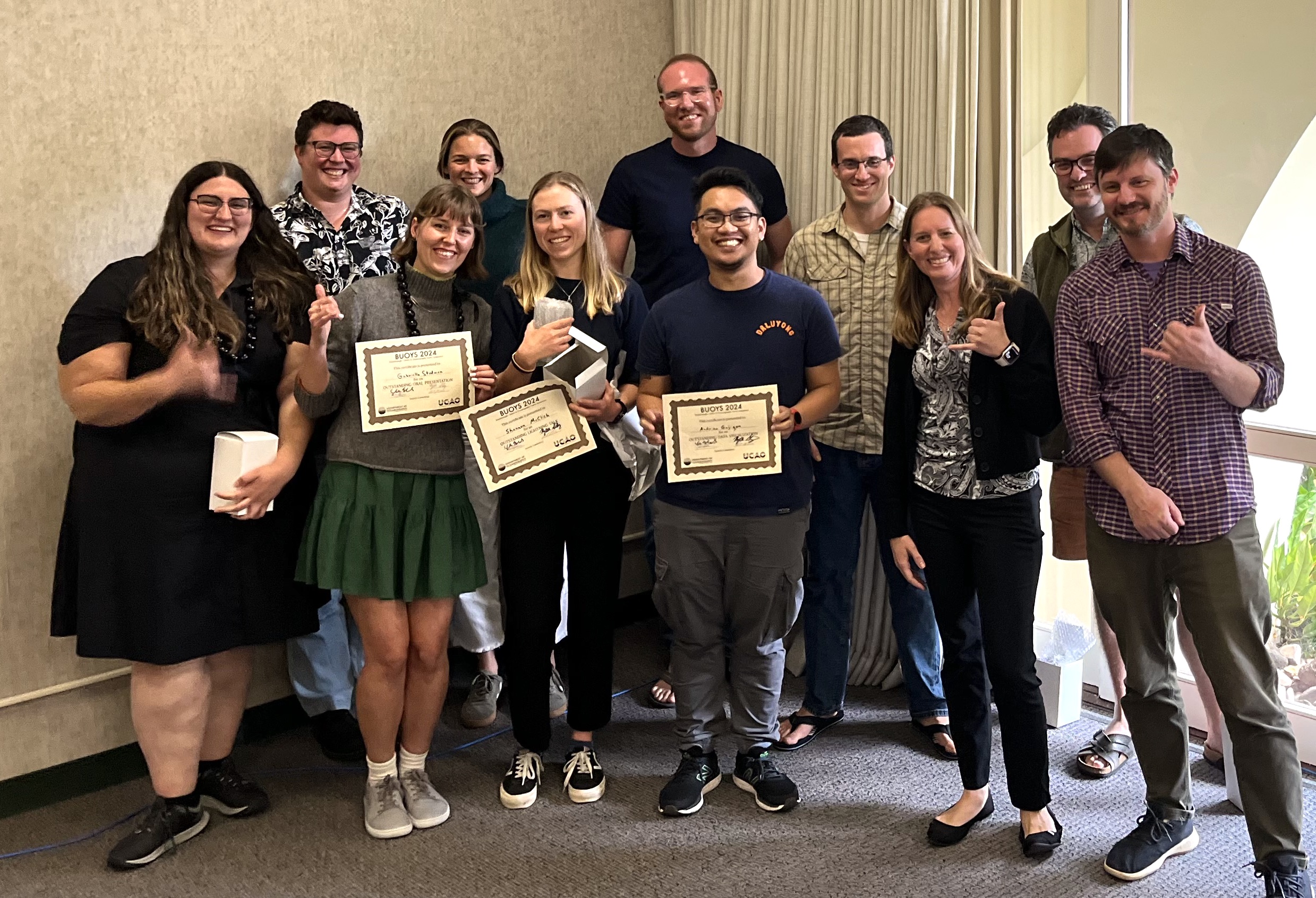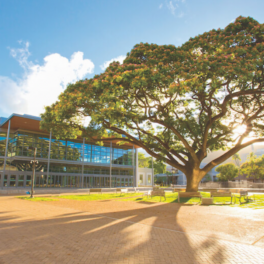Student-led symposium highlights ocean discoveries, career paths, mental health
 BUOYS award recipients and faculty who helped organize the event.
BUOYS award recipients and faculty who helped organize the event. A two-day symposium that offered professional and personal development opportunities was organized by oceanography graduate students, Victoria Assad and Liz Miller, and hosted this spring by the University of Hawai‘i at Mānoa Department of Oceanography and the Uehiro Center for the Advancement of Oceanography. The Breakthroughs: Uehiro and Oceanography Yearly Symposium (BUOYS), held in March, included students sharing their latest research and discoveries, a career panel, and community-building workshop centered around how the brain experiences grief.
With the theme of this year’s symposium being “From local to global: navigating the scales of oceanography,” graduate students presented lightning and full-length research talks covering novel research methods, ecology in coral reefs and the deep sea, human impact on coastal ecosystems, and physical, chemical, and biological dynamics in the open ocean. Undergraduate students from the Global Environmental Science program presented their research in a poster session for the attendees which included researchers, faculty, and students.
Showcasing career pathways
In an effort to address the needs of oceanography graduate students, professional development officers of the oceanography graduate student organization Nā Kama Kai, Christina Comfort and Kyle Conner, organized a careers workshop. They facilitated a discussion on opportunities beyond academia for marine scientists with a panel of people including researchers and administrators in academia, government agencies, and non-profit organizations.
“Oftentimes, learning the ‘hidden curriculum’ of academia can be highly dependent on who your advisor is, so we offered a professional development workshop in hopes of leveling the playing field,” said Assad.
“I think the most important part of these types of panels is normalizing wiggly career paths,” said oceanography graduate student Gabrielle Stedman. “The goal of graduate school is to build knowledge and skills, explore, and reflect. It is important for students to be reassured that they are in the right place and there is no such thing as an “efficient” career path.”
Connecting through a common loss
Assad and Stedman had been friends and colleagues for several years and after they each lost their fathers—Assad’s in May 2022 and Stedman’s in December 2023—the two connected on a deeper and more vulnerable level.
“Gabby reached out to me to learn how to navigate this and the grief process, and I recommended the book ‘The Grieving Brain’ by Mary Frances O’Connor, which comes at grief from a neuroscience perspective,” said Assad. “I really could have benefitted from knowing earlier on what is detailed in the book—that grief isn’t as simple as five stages and is a continual process of re-wiring expectations–and learning why my brain was processing or changing the way it was.”
“I not only heard from Victoria about her grief, but in reaching out for help, I learned of at least five other students around me who had experienced intense grief in graduate school,” said Stedman. “Grief isn’t just losing a loved one, it is also adjusting to natural disasters, global pandemics, ending a relationship, or large experiments failing. I was pretty shocked by how common grief is and felt it was important for graduate students and the greater department to make space for these conversations.”
Sharing empathy, understanding for the grieving brain
Stedman shared with Assad what an immense help the book was and that it was enlightening to learn how much the grieving process impacts people, and as academics, how much it impacts the brain. The two students decided they wanted to share this information with the rest of the department during the community workshop at the symposium.
“Grief is a universal experience we all go through, and something that would be really beneficial for all of us, as students, professors, and future professors and supervisors, to know more about and to be empathetic with one another when someone is going through loss,” said Assad.
In order to highlight the expert’s advice and words, Assad and Stedman read passages of the book and provided time for the event attendees to digest the ideas and have an open discussion.
“I think this approach made a difficult conversation more approachable and authentic,” said Stedman. “We tried to illustrate connections to the passages outside of loss of a parent, and the participants who shared helped illustrate the many colors and shapes of grief.”
Strengthening community
By approaching this difficult topic in the workshop, they invited space for mental health conversations with the aim to develop a greater sense of community and healthy working spaces.
“For me, I think the most beneficial part of that session was breaking down that barrier and simply approaching the uncomfortable topic,” said Assad. “The department is a community, and a community should work to care for each other, even when that means navigating topics that can bring a bit of discomfort.”
After the workshop, Assad and Stedman received overwhelmingly positive feedback. One professor acknowledged how brave it was of them to share their experiences and this information. Students who shared their own experiences, asked for resources to support their own healing or to learn how to support others. Many participants said they felt less scared about grief after the workshop and felt more comfortable being there for those experiencing grief. It also gave people words for feelings that they didn’t know were grief.
“Facilitating this workshop was really meaningful to Victoria and me,” said Stedman. “Additionally, the courage shown by the people who attended, and especially those who participated in the discussion, is what made the event special.”
Read also on UH News.



